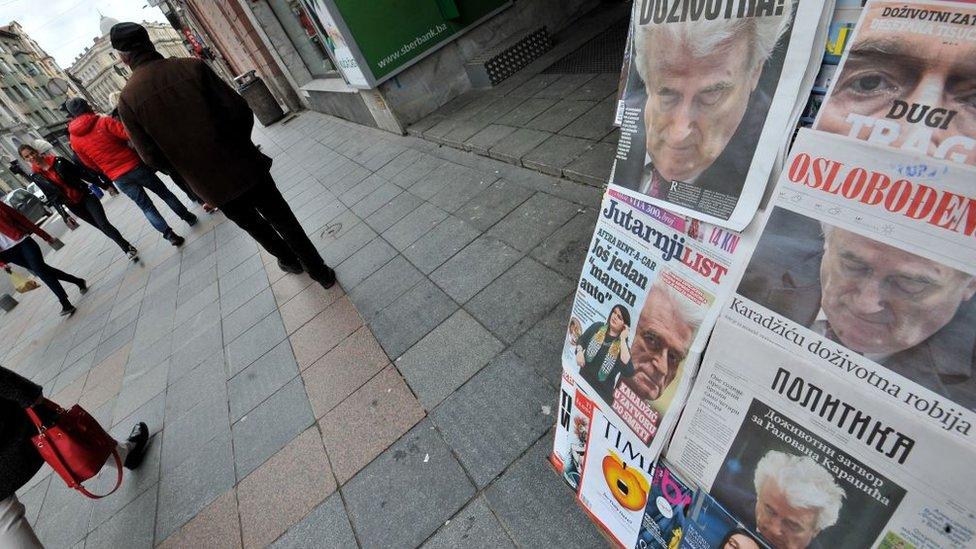Bosnia-Herzegovina media guide
- Published
This page is no longer being updated. It was last updated on 11 October 2024

Journalists in Bosnia work under pressure from the state and political parties
Divisions between the entities that make up Bosnia-Herzegovina are reflected in the media.
A lack of political consensus is reflected in the late rollout of digital TV and delays in passing laws on media ownership and public media funding.
TV is still the most popular medium but use of online media is increasing.
TV and radio outlets in Bosnia's two ethnic-based entities are more popular than the state public broadcaster, while commercial outlets struggle to make a profit in the crowded media market.
There are around 40 TV channels including three operated by public broadcasters, and 150 radio stations registered with the Communications Regulatory Agency.
There are eight daily newspapers, some 200 periodicals and about 600 news websites. effectively controlled by the ruling political parties.
The press is politically partisan and tends towards sensationalism. Media outlets and broadcasting regulators are subject to political pressure. Editorial standards are relatively low and journalists are poorly paid.
Bosnian broadcasters face strong competition from their counterparts in Serbia and Croatia, and popular networks from these countries are widely available on cable.
Transparency of media ownership is one of the main issues affecting Bosnia's ability to meet European media standards.
The US-based NGO Freedom House classifies the media environment as "partly free".
Regional fact-checking platforms have reported Russian influence on the media in BH, especially in Republika Srpska, and that it has grown significantly since Moscow's invasion of Ukraine in 2022.
Research by Friedrich Ebert Foundation (FES) published in November 2022 said fake and manipulative news was often spread by Serbian tabloids, but the main source of such news was the Serbian-language branch of Russia's Sputnik media outlet based in Belgrade.
There were 2.6 million internet users by February 2024, comprising 83% of the population (Datareportal.com). There is no filtering of online content. Facebook is the leading social media resource.
Press
Dnevni avaz, external (Daily Voice) - largest-circulation daily published in Sarajevo, seen as pro-Bosniak, but often criticises the main Bosniak party, the Party of Democratic Action (SDA)
Oslobodjenje, external (Liberation) - Bosnia's biggest daily, popular with the Bosnian diaspora thanks to a number of well known journalists and experts who contribute opinion pieces
Dnevni list, external (Daily Courier) - Mostar-based, together with the Bosnian edition of the Croatian daily Vecernji list, it is particularly popular among Bosnian Croats and focuses on Bosnian Croat and Croatian current affairs
Nezavisne novine, external (Independent Newspaper) - based in Banja Luka, seen as pro-Bosnian Serb government but more moderate than Glas Srpske.
Glas Srpske, external (Voice of the Serb Republic) - based in Banja Luka, strongly backs the Bosnian Serb authorities
Euro Blic , external- Serbian daily Blic's edition for the Serb Republic
Vecernje novosti, external (Evening News) - Serb Republic edition of Serbian daily Vecernje novosti
Vecernji list BH, external (Evening Courier) - Bosnian Croat edition of popular Croatian daily Vecernji list
Slobodna Bosna, external (Free Bosnia) - weekly based in Sarajevo, mostly focused on corruption and organised crime, intelligence issues
Dani, external (Days) - Sarajevo-based weekly
Television
BHT1, external - operated by public broadcaster BHRT - Radio-TV of Bosnia-Hercegovina, external. Based in the capital Sarajevo, it aims to serve all ethnic communities.
Federation TV (FTV), external - based in Sarajevo and run by RTVFBiH - Radio-TV of the Bosnian Muslim-Croat entity.
RTRS TV, external - run by RTRS - Radio-TV of the Serb Republic entity. It operates from Banja Luka, the Serb Republic's main city
Herceg-Bosna TV, external - based in Kiseljak and targets Bosnian Croats.
OBN, external - commercial
Nova BH, external - commercial
N1, external - commercial, news channel with production centres in Belgrade, Sarajevo and Zagreb, widely seen as one of the most trusted media in BH.
Al-Jazeera Balkans, external - commercial, regional outlet of Al Jazeera
Radio
BH Radio 1, external - run by public broadcaster BHRT, based in Sarajevo, state-wide, it serves all ethnic communities
Radio FBiH, external - Radio of the Federation of BiH run by Bosniak-Croat entity public broadcaster RTVFBiH, based in Sarajevo
RTRS Radio, external - run by Bosnian Serb public broadcaster RTRS, based in Banja Luka
Radio Herceg Bosne, external - Mostar-based, it is funded by Croat-majority cantons.
Bobar Radio, external - commercial, Bijeljina-based Bosnian Serb service
Radio Stari Grad (RSG), external - private, Sarajevo-based
News agencies
Federation News Agency (Fena), external - (Federalna novinska agencija) set up on instructions of the BH Federation government, based in Sarajevo, has correspondents across BH but specialises in reporting from the Federation entity, has a service in English
SRNA, external - (Novinska agencija Republike srpske, News Agency of the Serb Republic) based in Bijeljina, has correspondents in BH and across former Yugoslavia, focusses on news from the Serb entity, has a service in English
ONASA, external - (Nezavisna novinska agencija, Independent News Agency) based in Sarajevo, has a service in English.
Anadolu Agency, external - Bosnian outlet of Turkish official news agency
Online
News-based sites with unidentified owners have proliferated in recent years. Many of them have questionable professional standards and carry content that has been copied from news agencies or recycled from mainstream media. Some carry fake news and feature clickbait items.
Klix.ba, external - news site based in Sarajevo
Index.hr, external - Croatian news site
Avaz.ba, external - Dnevni avaz newspaper
Jutarnji.hr, external - Croatian daily newspaper
Slobodna-Bosna.ba, external - Slobodna Bosna weekly
Nezavisne.com, external - Nezavisne novine newspaper, based in Banja Luka
Dnevnik.hr, external - Croatian online daily
Bljesak.info, external - BH internet magazine
B92.net, external - Serbian news site